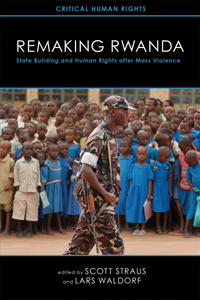| Remaking Rwanda State Building and Human Rights after Mass Violence Edited by Scott Straus and Lars Waldorf Critical Human Rights The first comprehensive critique of state reconstruction, peace-building, and human rights in post-genocide Rwanda “This rich array of careful scholarship provides a valuable, multifaceted view of a country still struggling with the aftereffects of genocide and civil war. It offers an important corrective to the naively rosy picture of Rwanda that too often prevails in the American media.”—Adam Hochschild, author of King Leopold’s Ghost In the mid-1990s, civil war and genocide ravaged Rwanda. Since then, the country’s new leadership has undertaken a highly ambitious effort to refashion Rwanda’s politics, economy, and society, and the country’s accomplishments have garnered widespread praise. Remaking Rwanda is the first book to examine Rwanda’s remarkable post- genocide recovery in a comprehensive and critical fashion. By paying close attention to memory politics, human rights, justice, foreign relations, land use, education, and other key social institutions and practices, this volume raises serious concerns about the depth and durability of the country’s reconstruction. Edited by Scott Straus and Lars Waldorf, Remaking Rwanda brings together experienced scholars and human rights professionals to offer a nuanced, historically informed picture of post-genocide Rwanda—one that reveals powerful continuities with the nation’s past and raises profound questions about its future. “Remaking Rwanda is an ambitious book, a rich and varied compilation that demonstrates the full complement of approaches, methods, and concerns informing the study of post-genocide Rwanda.” —Lee Ann Fujii, author of Killing Neighbors: Webs of Violence in Rwanda "An important contribution to scholarship both on Rwanda and on human rights. Many of the chapters, by leading and emergent Rwanda scholars, directly challenge received wisdom about governance in post-conflict-states, and raise serious questions about the impact of a range of transitional justice measures on longer-term peacebuilding." —Chandra Lekha Sriram, author of Peace as Governance: Power-Sharing, Armed Groups and Contemporary Peace Negotiations Scott Straus is associate professor of political science and international studies at the University of Wisconsin–Madison and author of The Order of Genocide: Race, Power, and War in Rwanda. Lars Waldorf, senior lecturer in international human rights law at the Centre for Applied Human Rights at the University of York, is coeditor of Localizing Transitional Justice and Disarming the Past: Transitional Justice and Ex-Combatants. Critical Human Rights Steve J. Stern and Scott Straus, Series Editors Contributors: An Ansoms, Federico Borello, Nigel Eltringham, Sarah Warshauer Freedman, Paul Gready, Aloys Habimana, Rachel Hayman Chris Huggins, Bert Ingelaere, Timothy Longman, Lyndsay McLean Hilker, Jens Meierhenrich, K. L. Murphy, Catharine Newbury, David Newbury, Kirrily Pells, Victor Peskin, Max Rettig, Filip Reyntjens, Kenneth Roth, Joseph Sebarenzi, Jason Stearns, Scott Straus, Carina Tertsakian, Susan M. Thomson, Lars Waldorf, Don Webster, Harvey M. Weinstein, and Eugenia Zorbas For more information regarding publicity and reviews contact our publicity manager, Chris Caldwell, phone: (608) 263-0734, email: publicity@uwpress.wisc.edu | ||||||||||||||
Pages
▼



p4q19m1u75 r7o81k9o95 l9c55e7d43 e5c87o9w02 l0m97g3c21 i8o19c1k63
ReplyDelete